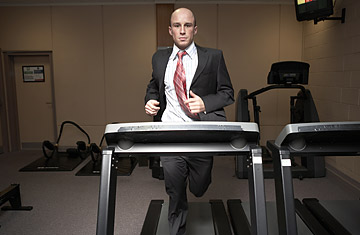
If you're like most people, you probably have a mile-long to-do list that includes items such as "Get blood pressure and cholesterol checked" and "Start walking 20 minutes per day." Who knows when you'll get around to all that? But if your employer offered to pay you cold, hard cash for taking better care of yourself, you'd probably start right now.
At least, that's one finding of a new study by human-resources consultant Watson Wyatt and a nonprofit outfit called the National Business Group on Health (NBGH). Bent on slashing costs left and right these days, a growing number of big companies are nonetheless investing serious money in bribing, er, encouraging employees to get healthier. Nearly 6 in 10 (58%) now offer wellness programs, up from fewer than half (43%) in 2007. And the percentage of companies paying people to ditch bad habits (especially eating junk food and not exercising enough) has gone from 53% in 2008 to 61% this year. (See pictures of cubicle designs submitted to The Office.)
That trend seems likely to continue. Another survey, by employee-benefits experts Towers Perrin, says that among employers who don't yet have programs in place, 33% plan to start one and 23% say they will introduce or increase financial rewards for their employees who get off the couch and snack on peaches instead of pizza. Smart. Notes the Watson Wyatt–NBGH study: "Companies that offer financial incentives report significantly higher participation in wellness programs." It's the old adage in action: What gets rewarded gets done.
Why the sudden solicitude for employees' well-being? You can probably guess. Health-benefit costs have shot up 31% in the past five years, Towers Perrin notes, with no end in sight. A huge and growing component of those costs: chronic conditions like heart disease and diabetes that often stem from unhealthy behaviors. Says Rachel Permuth-Levine, a deputy director at the National Institutes of Health: "Given that many employers are staggering under health-insurance costs linked to these diseases, prevention should be a no-brainer." (See the most common hospital mishaps.)
IBM, for one, couldn't agree more. In 2004, Big Blue launched five different wellness efforts aimed at getting its employees to work out more, lose weight, eat better, quit smoking and heed preventive medical advice. The company, which also has a program designed to encourage healthy habits in employees' children, has spent about $130 million on wellness so far, much of that in the form of cash rewards of up to $300 per employee annually for good behavior. Doris Gonzalez, 50, a senior program manager in corporate affairs at IBM's Armonk, N.Y., headquarters, now walks 20 minutes a day, does aerobics regularly and monitors her daily fat and calorie intake with the help of an online tracking system. Her small daughter is in the children's program, which encourages substituting fruit for candy and limiting TV time. "There is no bigger procrastinator than I am, but the program makes it easy," says Gonzalez. "Plus, they're paying me to be healthier."
IBM developed its own program, but some companies are hiring outsiders. Packaging and specialty-chemical giant MeadWestvaco, for instance, chose Virgin HealthMiles, a Richard Branson brainchild, to design a wellness regimen centered on pedometers, which count employees' steps. The pedometers are linked to a computer system that converts the steps into "healthmiles" — points that can be exchanged for up to $500 a year in cash or gift cards from merchants like Target and Bed Bath & Beyond. "You look out the window here at lunchtime and see people with pedometers on, walking all over the place," says Greg Williams, the company's safety and health director. Williams, 48, says he has lost 40 lb. and lowered his blood pressure since starting a pilot version of the program last summer, which has him taking about 8,500 steps a day. "And I got four $100 gift cards just for taking care of myself," he says. "I also feel better, sleep better and have more energy. That's the real payoff."
And the payoff for employers? Virgin HealthMiles CEO Chris Boyce says he has seen his company's programs, at about $2.50 a month per employee, cut health-care claims to as much as one-sixth their cost. On average, according to a nonprofit research group called the Wellness Councils of America, for every dollar that a company spends on helping employees get healthier, it can expect to save $3 in health-care expenses. On top of that, an article in last month's Journal of Occupational and Environmental Medicine says every dollar in medical and pharmacy expenses that companies pay is dwarfed by $2.50 in health-related productivity costs. Says Joyce Young, IBM's director of wellness: "In productivity and health-care costs combined, we've saved about $100 million over the past three years."
